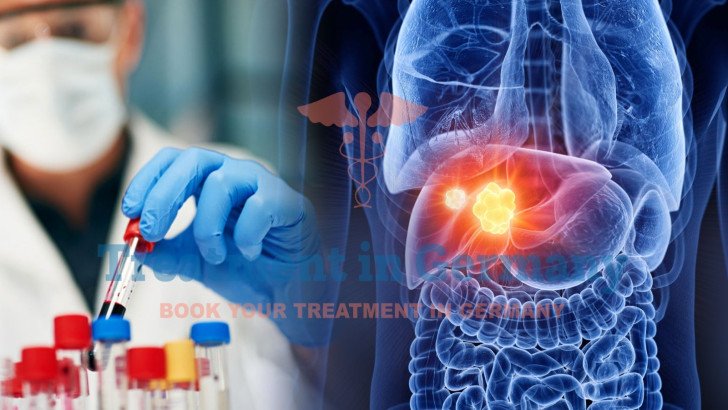
While traditional approaches like radiation therapy and chemotherapy show limited effectiveness, modern immunotherapy has revolutionized treatment outcomes at all stages.
Advanced liver cancer, encompassing hepatocellular carcinoma (HCC) and metastatic liver tumors, is a formidable disease often diagnosed at late stages. Immunotherapy has revolutionized treatment, offering new hope for patients with advanced disease. Germany, a global leader in advanced liver cancer treatment, excels in delivering innovative immunotherapy approaches.
Advanced liver cancer includes primary tumors like HCC and secondary cancers metastasizing to the liver. HCC, the predominant form, is often triggered by chronic liver conditions such as hepatitis B or C, cirrhosis, or non-alcoholic fatty liver disease. In stages III or IV, tumors may spread beyond the liver, rendering surgery or transplantation unfeasible. Immunotherapy empowers the immune system to target cancer cells, providing a critical option for patients with limited treatments. Germany’s hospitals and cancer clinics integrate immunotherapy with advanced diagnostics to enhance outcomes.
Immunotherapy enhances the body’s immune defenses to combat cancer cells, offering a precise alternative to conventional therapies. For advanced liver cancer, key immunotherapy approaches include:
German oncologists personalize immunotherapy using tumor profiling, ensuring tailored treatment at German cancer clinics.
Mechanisms of Immunotherapy in Liver Cancer
Immunotherapy counteracts the immunosuppressive environment of liver cancer, which often evades immune detection. The process includes:
German specialists use advanced tools to optimize immunotherapy, delivering precision care for liver cancer patients.
Germany’s Expertise in Immunotherapy for Liver Cancer
Germany’s advanced liver cancer treatment infrastructure makes it a global hub for immunotherapy approaches. Renowned university hospitals and cancer clinics offer innovative protocols, particularly for advanced or inoperable liver cancer.
Role in Advanced Liver Cancer Management
Immunotherapy is vital for stage III or IV liver cancer, where surgical options are limited. Checkpoint inhibitors like atezolizumab, combined with bevacizumab, significantly extend survival in HCC. Emerging therapies, such as CAR T-cell therapy and cancer vaccines, target high tumor burdens. German oncologists employ immunotherapy to manage metastatic disease or prevent recurrence after treatments like transarterial chemoembolization (TACE).
Synergy with Other Treatments
In Germany, immunotherapy is integrated with:
This collaborative approach, led by German surgeons and oncologists, ensures comprehensive liver cancer treatment.
Innovation through Clinical Trials
Germany’s leadership in clinical trials for liver cancer provides access to groundbreaking immunotherapy approaches. Patients can participate in studies exploring novel checkpoint inhibitors or personalized vaccines, often unavailable in the UK or US. Conducted at German cancer clinics, these trials advance immunotherapy for resistant liver cancer.
Why Germany Excels in Immunotherapy for Liver Cancer
Germany offers unparalleled advantages for liver cancer patients seeking immunotherapy:
Risk Factors and Prevention Strategies for Liver Cancer
Preventing liver cancer begins with addressing risk factors:
German specialists promote hepatitis vaccination, alcohol moderation, and weight control, with regular screening for high-risk groups.
Diagnostic Precision for Liver Cancer in Germany
Effective liver cancer treatment relies on accurate diagnosis. German hospitals use advanced tools, including:
German radiologists and pathologists ensure precise staging, guiding immunotherapy strategies.
Enhancing Quality of Life after Immunotherapy
Post-immunotherapy, German cancer clinics provide robust follow-up care:
Germany’s patient-centered approach supports long-term recovery for liver cancer patients.
Overcoming Challenges and Future Innovations
Immunotherapy faces hurdles, such as variable response rates and liver-specific immune tolerance. German researchers are tackling these with:
Future directions include AI-driven personalization and bispecific antibodies, broadening access to innovative liver cancer therapies.
Conclusion
Germany’s leadership in advanced liver cancer treatment through immunotherapy offers a beacon of hope for liver cancer patients worldwide. By combining cutting-edge immunotherapy approaches, such as checkpoint inhibitors and personalized vaccines, with multidisciplinary care, German cancer clinics achieve remarkable outcomes.
The expertise of German doctors, state-of-the-art hospitals, and access to clinical trials provide international patients with unparalleled treatment options. With shorter waiting times, transparent pricing, and holistic support, Germany stands out as a premier destination for immunotherapy for liver cancer, empowering patients to fight advanced disease and improve their quality of life.
🌍Why Patients Worldwide Prefer Our Medical Services in Germany – Key Benefits Explained:
Frequently Asked Questions
What is immunotherapy for liver cancer in Germany?
It includes checkpoint inhibitors, vaccines, and CAR T-cell therapy at leading German cancer clinics.
How much does immunotherapy for liver cancer cost in Germany?
Costs depend on the treatment plan; hospitals in Germany provide estimates post-evaluation.
Which hospitals offer immunotherapy for liver cancer in Germany?
Top university hospitals and cancer clinics specialize in advanced liver cancer treatment.
Are clinical trials for immunotherapy available in Germany?
Yes, German cancer clinics offer access to innovative trials for liver cancer.
How does immunotherapy enhance liver cancer outcomes?
It triggers targeted immune responses, improving survival in advanced cases.
Is follow-up care provided after immunotherapy in Germany?
Yes, including imaging, rehabilitation, and emotional support.
How does Germany compare to the UK/US for liver cancer treatment?
Germany leads in innovative liver cancer therapies, rapid access, and holistic care.
Can immunotherapy prevent liver cancer recurrence?
It targets residual cancer cells, lowering recurrence risk.
Does Germany support international patients?
Hospitals in Germany offer language assistance, travel coordination, and psychological support.
What are the latest advancements in immunotherapy for liver cancer in Germany?
Germany pioneers personalized vaccines, combination therapies, and biomarker-driven immunotherapy.
For further details, visit our contact us page
Kindly complete the form below, and our dedicated team will reach out to you promptly. We look forward to connecting with you soon!
Trierer Straße, 56072 Koblenz, Germany

.webp)
 (1).webp)

.webp)
 (1).webp)


.webp)
 (1).webp)

.webp)
 (1).webp)
